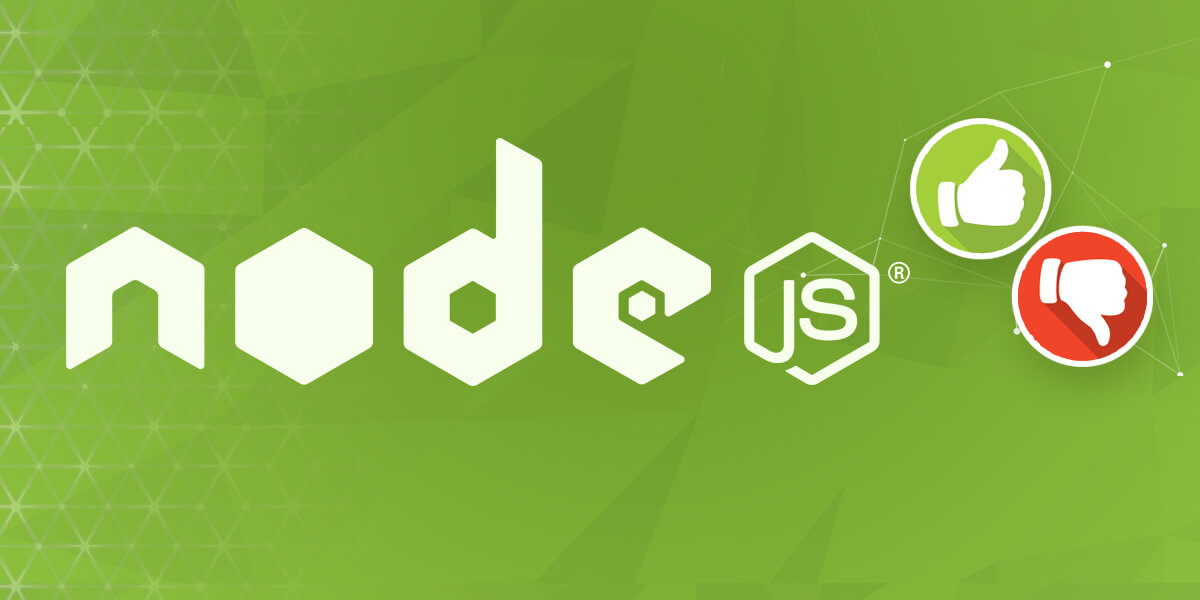The Advantages and Disadvantages of Node.js Web App Development
- Web
- August 10, 2023
There shouldn’t be any second thoughts over JavaScript being regarded as one of the most popular and widely used client-side programming languages.
It is basically employed as a web front-end development tool and proves to be more than a handy customer for the building of cross-development platforms.
In addition to that, it has also earned reputation due to its usage in various other popular platforms including React Native, PhoneGap, Titanium, Apache, NativeScript, Appcelerator etc.
In the current scenario, the area of application for JavaScript has expanded and now it is also being used for server-side programming. Node.js has indeed played an important role in this major shifting in the web development.
What is Node.js?
To answer this simple question of what is Node.js, we must understand the simplest definition of Node.js. Node.js is a Javascript run-time environment that helps in the execution of JavaScript server-side code. More about what is Node.JS, Node JS is an open–source cross-platform JavaScript that helps in the development of real-time network application.

Node.js offers the developers event-driven I/O APIs and asynchronous. It can also interpret JavaScript code via Google’s V8 JavaScript engine.
Moreover, it operates on a single threaded event based loop to make all executions non-blocking. However, you cannot consider Node.js as a framework and it has nothing to do with the PHP, .NET or JAVA.
Let’s get down to the major benefits and drawbacks (pros and cons) of using the Node.js as server-side programming.
Advantages or Pros Of Using Node.js
Let’s get down to the major advantages of using Node.js as server-side programming:

1. Node.js offers an Easy Scalability
One of the key advantages of Node.js is its scalability, making it a preferred choice for frontend development services providers. Developers can easily scale applications both horizontally and vertically. The applications can be scaled in horizontal manner by the addition of additional nodes to the existing system. These advantages of using Node makes it a preferred choice for web development.
Moreover, Node.js also offers you the option of adding extra resources to the single nodes during the vertical scaling of the application. So, it is highly scalable and provides better option than other JavaScript servers, another advantage of using Node.JS.
2. Easy to Learn
JavaScript’s popularity as a programming language ensures that most front-end developers are already familiar with its fundamentals. This familiarity makes transitioning to Node.js for backend development a smooth and efficient process.
With its simple syntax and unified language for both client and server-side coding, Node.js is easy to learn, allowing developers to quickly become productive and significantly reducing the learning curve. This makes Node.JS web development very easy to learn and use.
3. Node.js is used as a Single Programming Language
Why is Node.JS a simple programming language? as it offers developers the luxury of writing the server-side applications in the JavaScript. This allows the Node.js developers to write both the front-end as well as the back-end web application in JavaScript using a runtime environment.
And they don’t need to use any other server-side programming language. It also makes the deployment of the web applications simpler because almost all the web browsers support JavaScript.
4. The Benefit of Fullstack JS
Node.js has the benefit of been regarded as a full-stack JavaScript programming language for serving both the client and the server-side applications.
Therefore, the advantage of using Node.JS is that you don’t have to hire separate developers for backend as well as the front-end development. It saves both your valuable money and time.
Read also: Important Tips to Consider While Hiring Best Full-Stack Developers
5. Known for Offering High Performance
It has been mentioned earlier that Node.js interprets the JavaScript code via Google’s V8 JavaScript engine. This engine complies the JavaScript code directly into the machine code. This makes it easier and faster to implement the code in an effective manner.
The speed of the code execution also enhanced by runtime environment as it supports the non-blocking I/O operations. These advantages also contribute towards the growing popularity of Node.JS.
6. The Support of Large and Active Community
Node.js is blessed to have a large and active community of developers who keep on continuously contributing towards its further development and improvement.
Node.JS is very famous among developers in fact, the groups of Node.JS developers are well supported by the JavaScript programmers providing ready-made and easy solutions and codes in GitHub. It is expected that the developers will initiate many further developers in the future.
7. The Advantage of Caching
The open-source runtime environment of the Node.js also provides the facility of caching single modules. Whenever there is any request for the first module, it gets cached in the application memory.
The developers don’t have to re-execute the codes as caching allows applications to load the web pages faster and responds more swiftly to the user. This advantages both the developers and users.
8. Offers the Freedom to Develop Apps
Another advantage that Node.js offers to the developers is the freedom to develop the apps and software.
This is one essential feature, which remains absent in Ruby on Rails imposing certain guidelines. You can begin everything from scratch while developing applications.
9. Getting Support for Commonly Used Tools
With Node.js, the developers can get an extended support for the various commonly used tools. Let’s take an example. Suppose, you want to test the source code of Node.js application; you can do so by using the Jasmin and other such unit-testing tools.
When working with a Node.js web framework, managing project dependencies becomes seamless with the help of npm, a robust package manager. It allows you to easily identify, install, and maintain the necessary libraries for your project.
Additionally, tools like Grunt can be utilized for automating tasks, streamlining workflows, and enhancing the efficiency of your development process.
10. Handles the Requests Simultaneously
Since Node.js is providing the option of non-blocking I/O systems, it relatively helps you to process several requests concurrently.
If you have to handle many requests simultaneously choosing Node.JS is the best option as the system can handle the concurrent request handling efficiently better than others including Ruby or Python. The incoming requests get lined up and are executed quickly and systematically.
11. Node.js is Highly Extensible
The Node.js is known to be highly extensible, which means that you can customize and further extend Node.js as per their requirements. This benefit of Node.JS makes it highly preferable.
You can also make use of JSON to provide the scope for exchange of data between the web server and the client. It also is facilitated with built-in APIs for developing HTTP, TCP, and DNS etc. servers.
Disadvantages or Cons of Node.js
Well, Node.js also has some cons which need to be necessarily discussed.
1. Application Programming Interface (API) is Not Stable
One of the key problems that most of the developers encounter is the Application Programming Interface (API) keeps on changing at frequent intervals and does not remain stable.
At times, a new API appears having a number of backwards-incompatible changes. As a result the developers are forced to make changes in the accessible code bases to match the compatibility with the latest version of the Node.js API.
2. Does not have a Strong Library Support System
The JavaScript does not have a well equipped and robust library system in comparison to other programming languages.
The result is that the users are forced to take the support of common library for executing various tasks such as Object-Relational Mapping (ORM), processing of the images, handling database operations, and XML parsing etc.
This makes it difficult for the developers to even implement the common programming tasks using Node.js.
3. Asynchronous Programming Model
If you want to make the applications more scalable, the necessary requisite is adoption of the asynchronous programming model.
However, many developers may find this programming model to be more difficult in comparison to the linear blocking I/O programming.
Another con of the asynchronous programming is the codes tend to become clumsy and the programmers have to depend on the nested calls.
The Conclusion
The Node.js is more advantageous to the developers in comparison to its disadvantages. What’s more important is the fact that it has extended the area of JavaScript application and can be evidently used for both frontend as well as backend servers.
With the progress of time, more and more business organizations have adopted Node.js and have ended getting positive results.
Develop Your Web Application with MindInventory’s Node.js Expertise
At MindInventory, we specialize in leveraging the power of Node.js web frameworks to deliver exceptional software development services that result in high-performing, scalable, and feature-rich web applications. Our team of expert software developers combines technical proficiency with a deep understanding of your business objectives to create tailor-made solutions that drive results.
From seamless dependency management using npm to implementing efficient task automation with tools like Grunt, we ensure streamlined development workflows that enhance productivity and reduce time-to-market. Whether it’s crafting dynamic APIs, optimizing backend performance, or building robust real-time applications, our Node.js expertise enables us to provide software development services that are not only powerful but also future-ready.
Our proven track record includes helping businesses across diverse domains build web applications that stand out through speed, reliability, and user-centric design. By partnering with MindInventory, you gain access to a dedicated team committed to transforming your ideas into impactful digital products with flawless functionality.
FAQs About Node.js Web App Development
Node.js is an open-source, JavaScript run-time environment that helps in the execution of JavaScript code outside of a browser.
Node.js offers many benefits for web app development like easy scalability, easy to learn, high performance, highly extensible, support of the large and active community, and many more.
Node.js has some cons like Application Programming Interface (API) is not stable, lack of a strong library support system, and more development time.
Node.js is ideal for building scalable, real-time applications like chat apps, collaborative tools, and online gaming. It’s also great for developing APIs, microservices, and applications requiring high-speed data handling, such as streaming services or IoT solutions. Use Node.js when you need a fast, event-driven, and non-blocking architecture for your web applications.
Node.js is used for building fast, scalable, and real-time web applications, APIs, microservices, and applications that handle high-speed data processing. It’s ideal for use cases like chat apps, online gaming, streaming services, and IoT solutions.














